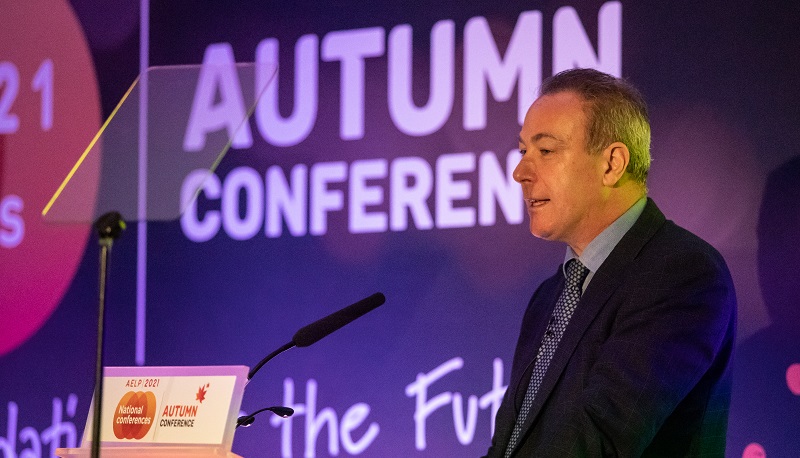A panel of ex-prisoners shared their experiences of education in the nation’s jails to MPs on the education select committee this week.
During the session on Tuesday, the five witnesses covered topics such as the use of technology in cells and why prisoners should be allowed to become apprentices.
The committee’s inquiry on prison education, which began in November 2020, has previously heard evidence from Ofsted, a range of prison education providers, campaigners and representative bodies.
Here are six key things we learned from the session…
1. Witnesses critical of prison education quality
Committee chair Robert Halfon quizzed the panellists about the quality of education they received while in prison.
Kiri Jolliffe, who is now a case worker with the St Giles trust, told the committee she did “not have much communication” with PeoplePlus, the provider at her prison.
Ben Leapman, who now works as a journalist for Inside Times, said his provider was Novus and that it was “dreadful”, with “no education I could do, so I worked in laundry for two years”.
However, he believed this was more to do with the prison itself, saying the governor was “not supportive at all of education”.
There was no education I could do, so I worked in laundry for two years
Fellow witness David Breakspear, now a prison reform campaigner, said it was down to his tutor, rather than the provider itself, that he was sitting before MPs that day.
In response to the witnesses’ complaints about Novus, a spokesperson said ensuring high-quality provision is their “top priority” and 95 per cent of their provision passes the Ministry of Justice’s quality assurance mechanism. PeoplePlus declined to respond.
2. Work is accepted by the prison, but education can be ‘completely shut down’
Jolliffe also told MPs that when the prison was on lockdown, or if there was a lack of staff, education would be “completely shut down” and learners locked in their cells. However, prisoners who worked as gardeners or in the kitchen would be allowed out their cells. “So it was really hard to want to do something to better myself when I knew I’ll be spending more time in this room.”
Femi Laryea-Adekimi, a network coordinator for the Prison Reform Trust, said if a prisoner worked as a wing cleaner, for example, “the prison accepts it” and the person is let out. But “if someone achieves a qualification, maybe business studies, there’s no acknowledgement of that from the prison, except from the prison’s education department”.
3. More can be done for short-term prisoners
Prisons should “get people moving on to a course”, especially if they are on a short sentence, “because every day counts when you’re on a short sentence,” Jolliffe said.
She spent several months in prison on remand before being acquitted and was not sure if she would end up with a criminal record following her trial. But, in the meantime, “they weren’t prepared to give me any type of work or any type of education whilst I was waiting.
“A big thing if you are on a short sentence as a woman and you come out of prison, you’ve got a criminal record. You’ve lost some time, however long that is, so you’re facing quite a bit of discrimination already.”
4. Allow more technology in cells
Breakspear told MPs that prison education “has to move with the times” and “too much” of prisoners’ time in cells is being wasted.
Committee member Kate Osborne MP said “a lot of people were nervous” about prisoners having technology in their cells. But Breakspear responded: “We’re not talking about having access to the internet. We’re talking about having access to pads that are read-only that doesn’t have any access to the outside internet.”
He said it would be “great” to have proper access to the internet under supervision, but “everything is about technology these days”, so his point is about “providing skills for digital technology”.
A lot more prisoners would be able to move into employment from the education within the prison
Last month, the Prisoners’ Education Trust called for “major investment” in digital technology in prisons and criticised government plans to roll out in-cell technology in just nine of 117 prisons next year.
5. Prisoners could have local impact and should be able to start apprenticeships
Prison education could have a “local impact” and “react to what their area needs,” said Breakspear. “Why not utilise schools, colleges, universities and prisons” to fill their area’s skills gaps, he asked.
This comes as the Department for Education is preparing to roll out local skills improvement plans nationwide, with employer representative bodies being handed responsibility for orientating local training provision towards the needs of local employers.

The panel also pressed for prisoners to be allowed to undertake apprenticeships, with Laryea-Adekimi saying local employees should not “sideline prisoners,” as allowing them to take up apprenticeships would mean “a lot more prisoners would be able to move into employment from the education within the prison.
“100 per cent apprenticeships should be able to be started in prisons,” he said, raising the example of someone starting an electrician course: “What stops them from achieving the practical side within the prison – there’s electricity within the prison?”
The government proposed a “prisoner apprenticeship pathway” in 2016, with close involvement from the Association of Employment and Learning Providers – but in 2019 the association was still calling for the pathway to get off the ground.
6. National college for prison education should be created
Leapman used the session to speak about the idea of a national college for prison education, where prisoners can transfer to take higher education courses.
“I think it would be a really, really powerful incentive for prisoners, every prisoner all over the country who felt that they had the potential to do a degree level study.”
Pictured top, from left to right: Ben Leapman, Femi Laryea-Adekimi, David Breakspear, Kiri Jolliffe, Jonathan Gilbert









